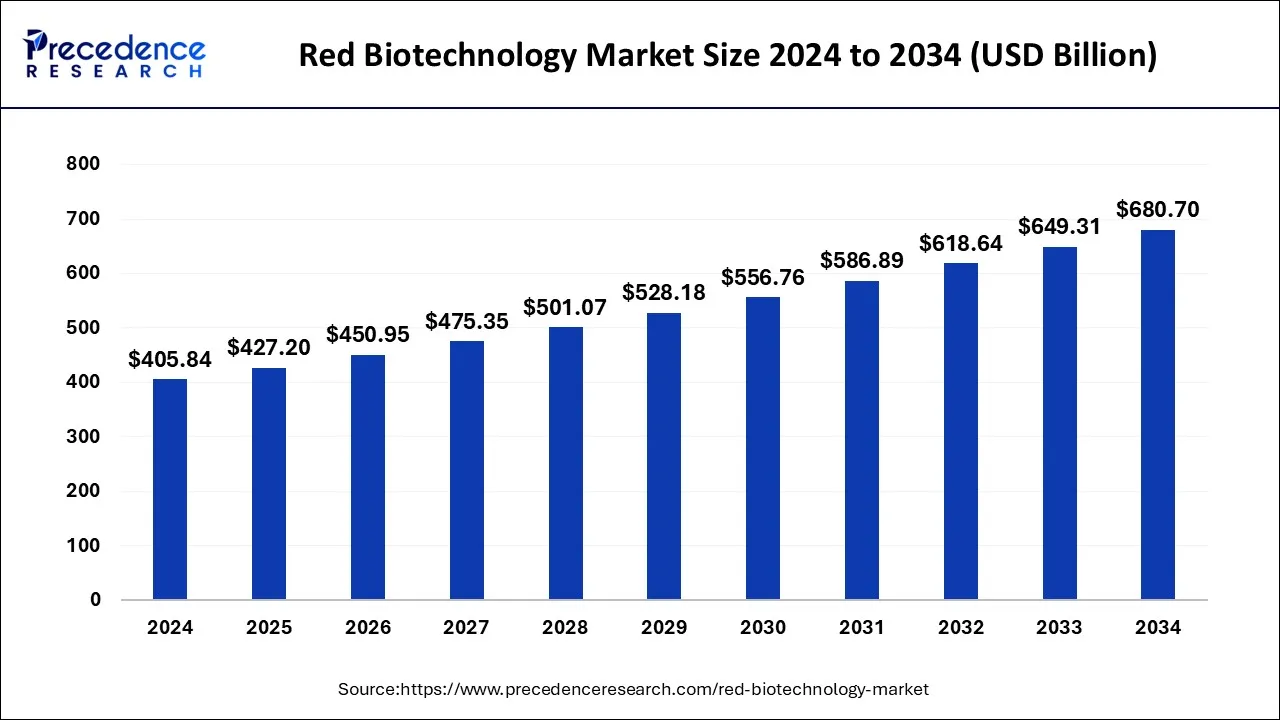Red Biotechnology Market to Reach USD 680.7 Billion by 2034
The global Red Biotechnology Market was valued at USD 405.84 billion in 2024 and is projected to reach USD 680.7 billion by 2034, growing at a CAGR of 5.3%.
Red Biotechnology Market Key Insights
- North America accounted for over 38% of the market share in 2024.
- Monoclonal antibodies led the market in revenue share by product in 2024.
- The pharmaceutical & biotechnology companies segment contributed 46% of the revenue share in 2024.
- CMOs & CROs are expected to grow at a CAGR of 12.9% between 2025 and 2034.
The red biotechnology market, encompassing biopharmaceuticals, gene therapy, and regenerative medicine, is poised for substantial growth in the coming years. In 2023, the global market was valued at approximately USD 397 billion and is projected to reach around USD 678 billion by 2033, with a compound annual growth rate (CAGR) of 5.5%. This expansion is primarily driven by advancements in genetic engineering, increasing prevalence of chronic diseases, and a rising demand for innovative therapeutic solutions.
Sample Link: https://www.precedenceresearch.com/sample/1010
Market Drivers
Several factors contribute to the market’s growth. The rising prevalence of chronic diseases such as cancer, cardiovascular disorders, and diabetes necessitates the development of novel biopharmaceuticals and personalized medicine solutions. Advancements in biotechnology, including gene editing and synthetic biology, have enabled the creation of targeted therapies and improved diagnostic tools. Additionally, increased healthcare expenditure globally has facilitated greater investment in research and development, further propelling the market forward.
Opportunities
Emerging markets present significant opportunities for expansion. Regions such as Asia-Pacific and Latin America are experiencing improvements in healthcare infrastructure, rising health expenditures, and increased insurance coverage, making advanced biotechnological solutions more accessible. The growing adoption of precision medicine and the integration of artificial intelligence in drug discovery and development processes also offer promising avenues for innovation and market growth.
Challenges
However, the market faces challenges, including high research and development costs, complex regulatory frameworks, and ethical concerns surrounding genetic engineering and stem cell research. Navigating these regulatory landscapes can be time-consuming and costly, potentially hindering market entry and growth. Technological limitations, such as difficulties in scaling up production and ensuring product consistency, also pose significant hurdles.
Regional Insights
Regionally, North America dominates the red biotechnology market, accounting for over 38% of the global share in 2023. This leadership is attributed to a robust healthcare infrastructure, significant investments in research and development, and the presence of major biotechnology firms. Europe follows, driven by a strong emphasis on personalized medicine and supportive governmental policies. The Asia-Pacific region is anticipated to witness the fastest growth, fueled by increasing healthcare investments, a rising burden of chronic diseases, and supportive regulatory environments.
Read Also: Healthcare Service Robots Market
Market Companies
Recent Developments
Segments Covered in the Report
By Product Type
- Monoclonal Antibodies
- Polyclonal Antibodies
- Recombinant
- Proteins Vaccines
- Cell-Based Immunotherapy Products
- Gene Therapy Products
- Cell Therapy Products
- Tissue-Engineered Products
- Stem Cells
- Cell Culture
- Viral Vector
- Enzymes
- Kits and Reagents
- Animal models
- Molecular diagnostics
- Others
By Application
- Pharmacogenomics
- Biopharmaceutical Production
- Gene Therapy
- Genetic Testing
By End-user
- Research Institutes
- CMOs & CROs
- Biopharmaceutical Industries
- Others
By Geography
- North America
- Europe
- Asia Pacific
- Middle East & Africa
- Latin America

